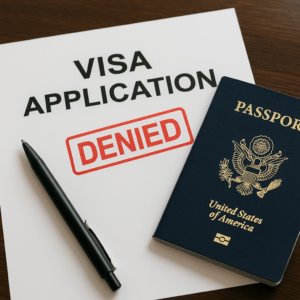Enterline and Partners is pleased to share that we were able to overcome a refusal for one of our clients who was successfully issued an EB-2 Immigrant Visa in the Philippines.
Our client, a healthcare provider, was petitioned by a U.S. employer as a physical therapist. After the Form I-140 Petition for Alien Employment was approved by the United States Citizenship and Immigration Services through expedited processing, the case was immediately forwarded to the National Visa Center (“NVC”). While at the NVC, the COVID-19 pandemic was declared which resulted in our client’s case being delayed. Our attorneys worked closely with the NVC and the U.S. Embassy in Manila to expedite the case for consular processing.
During our client’s immigrant visa interview, the consular officer misinterpreted a few key points of the law which resulted in our client’s application being denied and placed in administrative processing. One of those legal points was that our client was subjected to the President Proclamation restricting certain immigrant visa applicants from being issued immigrant visas.
Our attorneys quickly drafted a robust response to the consular officer’s findings and requesting that our client’s matter be further reviewed on a supervisory level at the Immigrant Visa Unit. A copy of our response was also forwarded to the Legal Adviser for Consular Affairs in Washington, District of Columbia also known as LegalNet. A few days later we received an email from the U.S. Embassy acknowledging our legal position. Less than 48 hours later, our client’s EB-2 immigrant visa was issued.
We are happy to report that our client is now in the United States treating patients in the battle against COVID-19.
For more information, contact us at info@enterlinepartners.com and speak with a U.S. immigration attorney in Ho Chi Minh City, Manila and Taipei.
ENTERLINE & PARTNERS CONSULTING
Ho Chi Minh City, Vietnam Office
Suite 601, 6th Floor, Saigon Tower
29 Le Duan Street
Ben Nghe Ward, District 1
Ho Chi Minh City, Vietnam
Tel: +84 933 301 488
Email: info@enterlinepartners.com
Facebook: Enterline & Partners – Dịch vụ Thị thực và Định cư Hoa Kỳ
Website: http://enterlinepartners.com
Manila, Philippines Office
Tel: +632 5310 1491
Email: info@enterlinepartners.com
Facebook: Enterline and Partners Philippines
Website: https://enterlinepartners.com/language/en/welcome/
Copyright 2021. This article is for information purposes only and does not constitute legal advice. This article may be changed with or without notice. The opinions expressed in this article are those of Enterline and Partners only.








